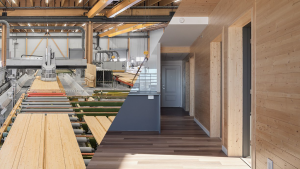A Quebec company says it has developed a self-disinfecting biocidal treatment for aluminum products that kills bacteria in seconds.
A3 Surfaces, based in Chicoutimi, Que., claims its patent-pending process called UmanProtek limits or eliminates the risk of viral or bacterial disease transmission in dozens of everyday aluminum hardware such as door handles, push plates and faucets, even tools and medical accessories.
This could revolutionize how cross contamination issues and the spread of viruses and diseases are contained and mitigated in the future. It also reduces concerns over potential inconsistencies in disinfection protocols of interior common touch hardware items.
The UmanProtek process becomes part of aluminium’s anodization operation. After electrolyte anodization forms nanopores on the alumina ceramic layer, UmanProtek introduces antimicrobial substances into those nanopores, and then partially closes them to control the spread of the antimicrobial agent.
Jean-Luc Bernier, vice-president of technology for A3 Surfaces, told the Daily Commercial News this is the key to the company’s invention.
Furthermore, while the aluminum surface becomes self-sanitizing, it does not sanitize anything touching it, like skin, thus avoiding any antibiotic resistance over time.
The treated aluminum has significant advantages over any other antibacterial material currently available, says Bernier.
“The only other product like it is copper. However, copper’s response time is too slow. It takes a matter of hours to shut down the cross contamination,” he explains.
In contrast, Bernier says UmanProtek kills bacteria in seconds in most cases.
UmanProtek is a breakthrough development 15 years in the making, the result of a 2005 year-end project undertaken by two CEGEP technology students in Quebec.
Due diligence conducted over the next five years by a major aluminum product manufacturer confirmed the validity of the concept. The inventors’ worked with about 200 different types of antibacterial agents before settling on an effective set of chemical compounds.
The implications are astounding and the list of possible public, commercial and residential building applications virtually endless.
A3 has already engineered a range of standard aluminum hardware items for retrofitting into many common applications in place of stainless steel. It also offers its process to any aluminum hardware manufacturer wishing to send its products for the anodizing/UmanProtek treatment.
“We don’t want to compete with the manufacturers in the fabrication of the products,” he says.
A3 is in partnership discussions with major aluminum manufacturers in the United States, India and Europe, with the goal of having large sheets of UmanProtek aluminum produced in the near future.
At that point, HVAC ducts and air intake plenums fabricated from aluminum processed with UmanProtek could eliminate airborne bacteria transmission, yet remain safe without regular cleaning.
Bernier explains the antibacterial treatment of sheet steel commonly used in ducting means the growth of the bacteria is only inhibited after it lands. However, the bacteria still remain.
“The best we can say is that it is bacteriostatic,” he states.
However, UmanProtek actually kills the bacteria in seconds. The premium cost of aluminum versus steel can be balanced against maintenance cost savings, not to mention the perception value associated with such high levels of sanitization.
Bernier says existing steel ducting could even be lined with a thin layer of aluminum treated with UmanProtek.
The question today, of course, is whether UmanProtek can kill SARS viruses like COVID-19. Bernier says scientists have told him that coronaviruses are actually quite fragile in comparison with many bacteria and that, in fact, UmanProtek uses the correct combination of biocides to kill viruses.
“We are working with a Level 3 Lab to prove it,” says Bernier. “We are 99 per cent convinced, but we want absolute proof.”
Meanwhile, longevity tests have confirmed that UmanProtek can last for many years.
“We conducted a simulation in an NRC subsidiary lab, a repetitive scrubbing test using everyday cleaners such as bleach, peroxide and so on. We have seen no deterioration. My best estimate would be a lifespan of 10 years, maybe as long as 20 years,” he claims.
After that, Bernier says the surface can easily be retreated without removal.
John Bleasby is a Coldwater, Ont. based freelance writer. Send comments and Inside Innovation column ideas to editor@dailycommercialnews.com.









Recent Comments
comments for this post are closed